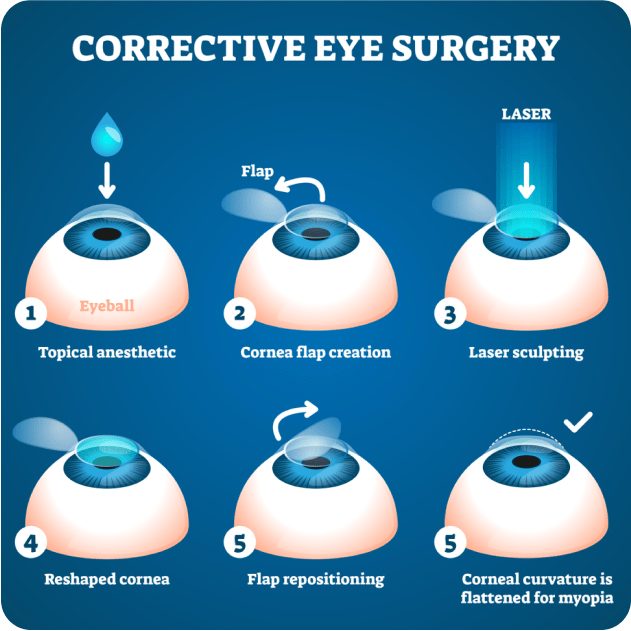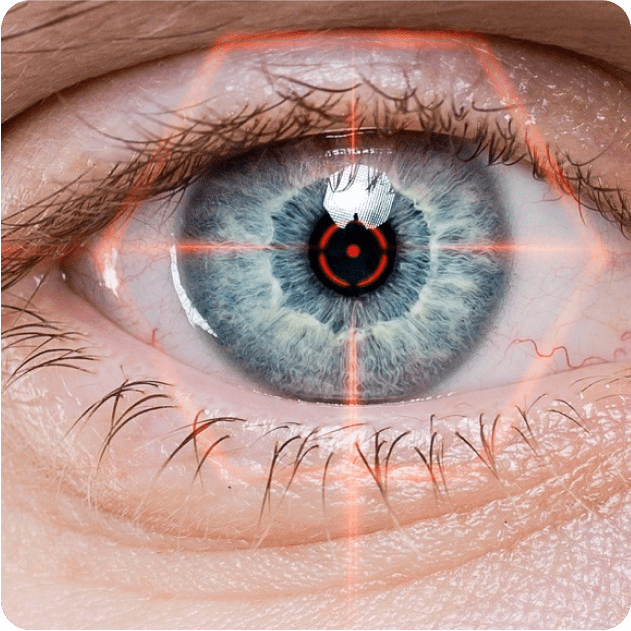
What is laser eye surgery?
Laser eye surgery is a procedure that aims to improve vision by reshaping the cornea, the front part of the eye. It works like adjusting a camera lens’s focus, helping light properly reach the retina at the back of the eye. This can correct common vision problems such as nearsightedness, farsightedness, and astigmatism. The surgery is typically quick and does not cause much discomfort. People usually stay awake during the procedure, though some may receive a sedative to help them relax.
Afterward, eye drops are prescribed to aid in the healing process. Laser eye surgery can reduce dependence on glasses or contact lenses and improve overall visual clarity.
There are different types of laser eye surgery, namely, LASIK, SMILE, ASLA/PRK
LASIK, SMILE, and ASLA/PRK are different types of laser eye surgery procedures:
LASIK: Laser-Assisted keratomileusis is a two-step procedure that involves using two lasers for vision correction. It is suitable for individuals with adequate corneal thickness.
SMILE: Small Incision Lenticule Extraction is a technique that involves creating a small incision and using a laser to reshape the cornea. It is primarily used for correcting high degrees of nearsightedness.
ASLA/PRK: Advanced Surface Laser Ablation or Photorefractive Keratectomy uses an excimer laser to reshape the cornea and correct refractive errors. It is performed on the surface of the cornea and can be suitable for individuals with thinner corneas or those who are not eligible for LASIK.
These procedures aim to improve vision by reshaping the cornea, allowing light to focus properly on the retina and reducing the need for glasses or contact lenses. The specific procedure recommended depends on individual factors and the nature of the vision problem.


Who is the best candidate for laser eye surgery?
Laser eye surgery is generally suitable for individuals with common vision problems like myopia, hyperopia, or astigmatism. However, age and corneal thickness are important factors in determining candidacy for the procedure.
Children under 18 are not typically eligible for laser eye surgery due to the ongoing development of the cornea during this stage.
Having an adequately thick cornea is crucial for the surgery. Thin corneas pose higher risks and potential complications. Therefore, individuals with an appropriate corneal thickness are considered better candidates for laser eye surgery.
In most cases, laser eye surgery is painless. Patients may experience mild pressure in their eyes during the procedure, but it is generally well-tolerated. Local anesthetic drops are used to numb the eyes, and in some cases, a mild sedative may be given to help patients relax.
After laser eye surgery, some individuals may experience minor side effects, including:
Dryness in the eyes: The surgery can temporarily decrease tear production, leading to mild discomfort and affecting vision quality. This usually lasts for the first few months after the procedure.
Disturbances in vision: Halos, double vision, and glare may be experienced, making it challenging to see clearly. Increased light sensitivity and halos around bright lights can persist for a few days to weeks.
Under- Correction/Over-Correction: In some cases, too little or too much tissue is removed during surgery, resulting in under-correction or over-correction.
Astigmatism: Uneven tissue removal during surgery can cause astigmatism, which may require additional surgery or the use of glasses.
Flap issues: During the healing period, complications such as abnormal growth under the flap, excessive tearing, or infection can occur.
It is important to have a detailed discussion with your ophthalmologist before the procedure to address any concerns and ensure a clear understanding of potential side effects and their management.
The entire procedure usually takes around 1-2 hours. The surgery itself only takes about 20 minutes for both eyes. How much time you will be off work depends on the type of treatment you have opted for.
Patients with myopia (short-sightedness):
- LASIK 1-2 days
- SMILE 3-5 days
- ASLA/PRK 1-2 weeks
Patients with hyperopia may take slightly longer to fully recover.
After undergoing LASIK or SMILE surgery, you can typically fly as soon as the next day. For ASLA/PRK, it is recommended to wait 3-5 days before flying. However, it is important to consider your post-operative check-ups and follow any instructions provided by your ophthalmologist before making any travel plans.
It is advisable to wait approximately one month before resuming sports or swimming activities after laser eye surgery.
The number of post-operative checks required after laser eye surgery varies depending on the procedure:
LASIK and SMILE typically require checks on the same day or the day after surgery, after 1 week, and after 1 month. ASLA/PRK generally require checks 3-5 days post-procedure, 1 month, and 3 months after surgery. It is important to consult your surgeon for the specific post-operative care schedule tailored to your individual case.
